All the evil karma wrought by me from long ago
stems from a greed, anger, and folly without beginning.
It is all born of my body, mouth, and mind.
I now repent of it.
Verse of Repentance
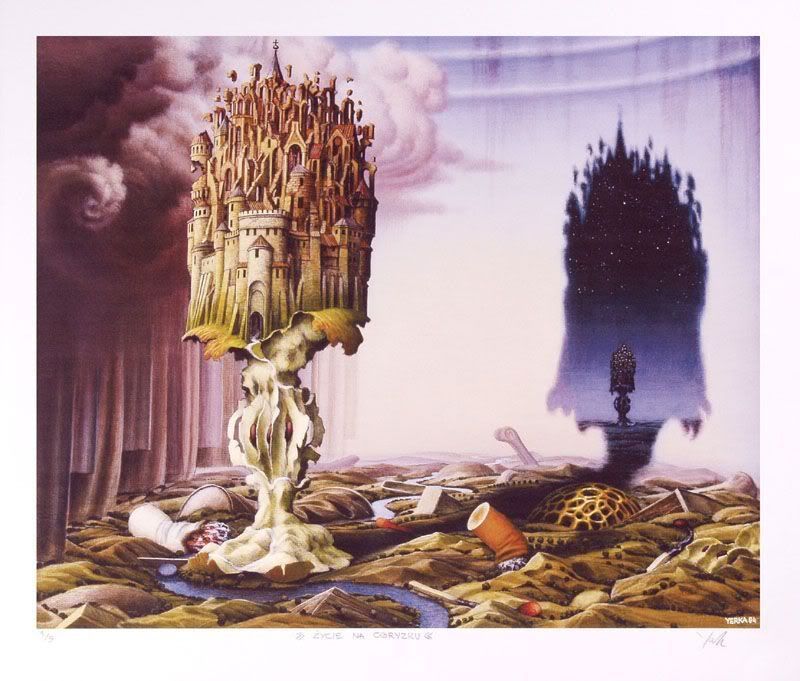
Time without beginning or end bestows on existence at one and the same time the character of a burden or debt, and the character of a creativity or freedom, while in the background a kind of infinite drive is seen to be at work. Time without beginning or end can come about only if it contains at its ground the presence of an infinite openness.
In the compulsion to be engaged incessantly in doing something, our being and time bears for us the marks of an infinite burden. The sense of a "project," a throwing-forward (entwerfen), essential to human Dasein means that our existence is a burden unto itself. That time is infinitely open in both directions, without beginning or end, makes time itself, as well as our existence in time, an infinite weight saddling our existence. Or, seen from within, it means that we are impelled to constant new becoming and incessant change within a time in which we come to be and pass away from one fleeting instant to the next. An infinite drive urges us on without a moment's rest. At the same time, however, this infinite drive signifies the unrestricted and boundless nature of the possibility we contain within ourselves. Thus, working at perpetually doing something---the karmic activity of "body, mouth, and mind"---irrespective of its inner necessity already appears as our freely working to create something new.
Time that is in such a sense without beginning or end, together with our existence in that time, cannot be thought of apart from the totality of relationships that make up the world. Our existence comes about from within an infinite nexus, reaching back into the past from our parents to their parents, back before the appearance of the human race, the constitution of the solar system, and so on ad infinitum, even as it extends equally without limit into the future. This temporal nexus, bound up with an infinitely large nexus of spatial relationships, makes up our world. Accordingly, all we are engaged in doing in time without beginning or end, that being-at-doing(samskrta) of each moment seen as the becoming of time itself, comes down to the intersection of two movements: vertically, it grows out of the whole nexus of relationships present "since time past without beginning" at the background of our being in the world and time; and horizontally, it occurs in connection with all things existing simultaneously with us. The existence in which we have our being at constantly doing something comes about from a dynamic, limitless world-nexus. Time without beginning or end and being in such a time, or what we may call infinite drive, have to be seen from such a perspective. This is what is meant by saying that being-in-the-world has to be seen "under the Form of infinity." The same perspective appears in the Buddhist Verse of Repentance as the confession that all evil karma issues from body, mouth, and mind (deed, word, and thought), and that, moreover, this karma springs from "a greed, anger, and folly without beginning."
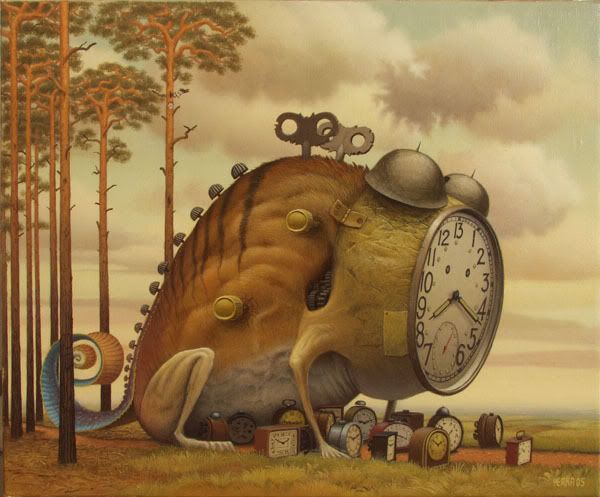
Time without beginning or end, together with our being in that time (reference), presents itself to us, then, with the character of an inexhaustible task that has been imposed on us, which means that we can maintain our existence in time only under the form of constantly doing something. Being in time consists essentially in being obliged ceaselessly to be doing something. It is like the feudal serf compelled to toil year in and year out to meet his quota, or like the inmate in a penitentiary serving at hard labor to pay off his debt to society and expiate his guilt. To assure our own existence, we have to work off the burden imposed on it. The only difference between us and the serf or convict is that the debt weighing on our existence cannot be attributed to someone other or something else. It is from the very beginning part of the essence of an existence that "is" in the world of time.
Of course when we seek the origins of that mode of being in time, an answer might be conceived of in terms of a punishment meted out for sin by an other. This is the case, for instance, with the "original sin" of Adam, which is seen as the origin of being in time, that is, being as something that is born and dies, something that must "work by the sweat of its brow." This is one of the mythical representations of fate according to which human existence has been understood under the Form of infinity. The idea of debt or guilt of existence appears often in ancient myth. When it comes to the essence of human existence, one could say that man the mythmaker saw things that man the intellectual has failed to see.
Now to see this "debt" as an essential part of being-in-time, means that it entails an inexhaustibility. While there are limits to obligations imposed by social or legal regulations, the debt essential to existence is as elemental as existence itself. It is infinite because in doing something, that is, in the very act whereby we exhaust our debt, we sow seeds of a new debt. The very work through which we make things lighter for ourselves and unburden ourselves, in the very work of freeing ourselves of the "existence" that weighs heavy upon us, in a word, through our own "free" work, it is simply our own existence that we are preserving in the process. The interminable payment of this debt creates a new debt through the samskrta of the payment, and in this process we see the functioning of the basic pattern of karma. This samskrta mode of being condemned to be continually engaged in doing something, contains in its essence this sense of the infinite or the inexhaustible. The home-ground that gives birth to the debt is the home-ground of the karmic activity that works to dissolve it. Each of the deeds that remove the debt invariably return to the home-ground of the debt, in each case reinstating the debt. And this return to the home-ground is, at the same time, the springboard for new karmic activity to work off the new debt. So it is that our Dasein, even as it endlessly steps outside of itself, by that very act never departs its own home-ground but keeps itself shut up perpetually within itself. The self is at all times, unendingly, itself, permanently tethered to itself. This self-contradictory dynamic of "tying oneself up with one's own rope," so to speak, is the essence of our existence.

The "Consciousness Only" school (Vijñapitamatrata) spoke in this connection of a "store-consciousness" (alaya-vijñana), on the basis of which it conceived of a dynamic nexus wherein "seeds" give birth to "manifest action" in deeds, words, thoughts, which in turn "perfume" the seeds with a lingering aroma (vasana). While the thought developed around this conception may be rich in insight, the essence of our being within time has thus come to be conceived in a dynamic, spontaneously self-developing "causal" framework, infinitely open in both directions of time. The conception of time as without beginning or end is essentially inseparable from such a pretension as being-in-time.
As a being-in-the-world, the essence of our Dasein lies within the infinite world-nexus described above. The indebtedness of our existence and the karmic character of our activities come about only under the conditions of the world-nexus. This conditioning is an essential moment of our samskrta mode of existence. The world-nexus is woven deep into the stuff of the spontaneous self-development of our being-in-time (or our being as time). It is part and parcel of the being of restless, incessant becoming which seems to be spurred on from within by an infinite drive. When our being comes about as an incessant becoming brought about by its being destined to a constant doing, this doing can only come about as a doing something and this, in turn, cannot come to be without this world-nexus.
In general the two aspects of determining the self and being determined by an other are inseparable in existence within time. In other words, existence invariably comes about as a co-determination. Basically, for an existence to be determined by an other means that it determines itself as a being that is so determined. Each case of determination at the hands of an other is a mode of being of the self, and as such a self proceeds in turn to determine the other. It can receive determination by the other only as a self-determination. To take an expression from the ancients, it is a "causal kinship" (hetu-pratyaya) set up in the world-nexus woven of inner and outer causes, such that all beings in the world come to be by virtue of this causal kinship.
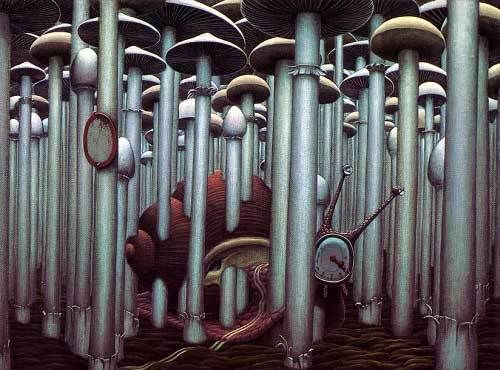
If we grant that the fact that I "am" in time, that I am myself, comes about as a constant becoming through constant doing something (becoming I myself who am determined from one moment to the next), in this existence of mine the whole world-nexus, linked together in mutual reliance and cooperation through casual kinship, is at all times coming to light. While determining my Dasein to be the Dasein it is, this infinite nexus is bound to it in casual kinship. This makes it necessary to consider the whole of mankind, the whole of living beings, the whole world, as "destined" to form a single whole with my existence and my work. At the home-ground of my Dasein, directly beneath my work, this whole labors to make this Dasein what it is, that is, to determine it. My own labors all become in each case one with the ebb and flow of the whole nexus since time past without beginning. They become manifest, as it were, as a focal point of that total ebb and flow. They can all be seen as having appeared from out of that unlimited whole that lies behind them. When being as a being-in-the-world becomes itself through its being condemned to do something, it does so at all times in this fashion.
Dasein is an essentially unlimited task unto itself. That it is itself, that it makes itself to be itself, and thus becomes itself, means that it owes itself an unlimited debt. And this in turn means an infinite debt with respect to all others. This debt can be traced back to that fact that Dasein exists within a world-nexus that is temporally and spatially infinite; that in relating to things it is constantly engaged in doing something; and that it originates in such a fashion within time.
Unlike what takes place on the field of karma, however, on the field of sunyata, Dasein breaks down the total self-enclosure of avidya and goes back to its original Form of the non-duality of self and other. Instead of standing on nihility, it stands on non-ego. Breaking away from the infinite drive, it acheives a non-doing, that is, a doing that is free of the energy of the self.
In this sense, the field of emptiness is a field of absolute transcendence, a transcendence of time and place, of causal necessity, and of the very world-nexus itself. In the present instant, the present is at the home-ground of all points of time past and future without ever taking leave of the home-ground of the present. For an instant is ever a present now; each point of time past and future, when it is constituted as time, can only do so as an instant. In this way, the present, while inexorably the present of time, is nonetheless simultaneous with each and every point of time past and future. The past never ceases to be before the present, and the future after the present; the order of before and after in temporal sequence is never abolished. That is, while each and every point of time is itself---the past inexorably as past, the future inexorably as future---they are also simultaneous with the present. In this simultaneity, the present encompasses all pasts and all futures and maintains a collective hold (dharani) over them. What is being so encompassed and so maintained in the present? It is not only what actually did occur in the past and what actually will occur in the future. There is also what did not occur in the past but might have. All those various possibilities that have been eliminated in the determination to actualization and have come to be buried away without ever getting beyond mere possibility also enter into the dharani of the present.
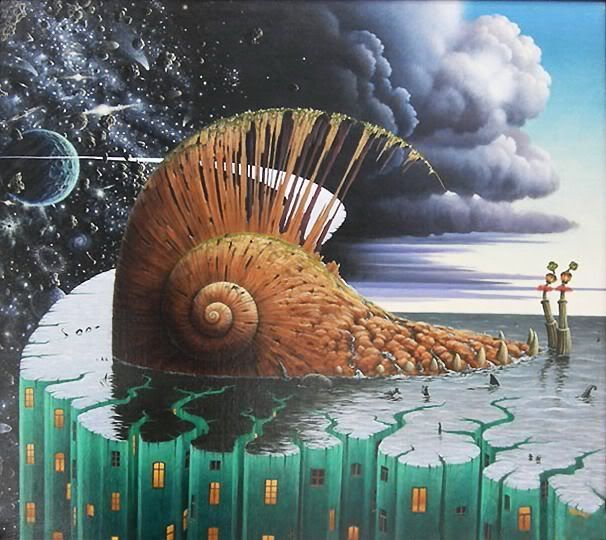
The field of reality as a cicuminsessional interpenetration is at the same time, as a field of emptiness, a field of infinite indeterminateness or inexhaustible possibility. It is what the Zen phrase calls "the inexhaustible storehouse with not a single thing in it." And the Dasein that emerges into its nature on the field of emptiness does so as something maintaining a collective hold, in such an inexhaustible storehouse, on the home-ground of the present.
Freedom as it is in itself is not simply subjective freedom. Subjective freedom, which is the cornerstone of so-called liberalism, is not yet rid of the self-centered mode of being of man himself. True freedom is an absolute autonomy on the field of emptiness, where "there is nothing to rely on." And this is no different from making oneself into a nothingness in the service of all things.
The same applies to equality. True equality is not simply a matter of an equality of human rights and the ownership of property. Such equality concerns man as the subject of desires and rights and comes down, in the final analysis, to the self-centered mode of being of man himself. It has yet to depart fundamentally from the principle of self-love. And therein the roots of discord and strife lie ever concealed. True equality, on the contrary, comes about in what we might call the reciprocal interchange of absolute inequality, such that the self and the other stand simultaneously in the position of absolute master and absolute servant with regard to one another. It is an equality in love.
Only on the field of emptiness does all this become possible. Unless the thoughts and deeds of man one and all be located on such a field, the sorts of problems that beset humanity have no chance of ever really being solved.
(Religion and Nothingness, by Keiji Nishitani)
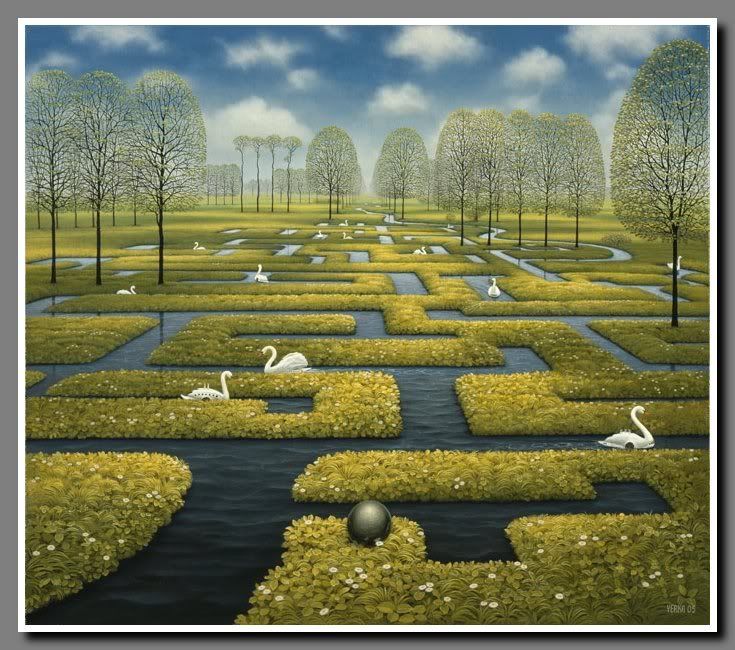
{Art by Yerka/Programming by DPC}
Friend, please tell me what I can do about this world
I hold to, and keep spinning out!
I gave up sewn clothes, and wore a robe,
But I noticed one day the cloth was well woven.
So I bought burlap, but I still
throw it elegantly over my left shoulder.
I pulled back my sexual longings,
and now I discover that I'm angry a lot.
I gave up rage, and now I notice
that I am greedy all day.
I worked hard at dissolving the greed,
and now I am proud of myself.
When the mind wants to break its link with the world
it still holds on to one thing.
Kabir says: Listen my friend,
there are very few that find the path!
(Kabir, The Kabir Book)

